There’s a lot more to probiotics than eating yogurt and taking lactobacillus. Learn about all 3 types of probiotics, when to take them, the best brands of each, where to buy them, and more!
(Click here for the Free Printable version of this Guide!)
For years, Lactobacillus acidophillus dominated the discussion about probiotics. We were told to eat more yogurt and take a supplement any time we took antibiotics to rebuild the “good bacteria” in our gut.
But our understanding about what probiotics are and how they work has grown exponentially since then, and it’s time we took a fresh look at probiotics, including the three different types, when to take them, and the best brands of each.
What are Probiotics?
The official definition of a probiotic is “a live microrganism which, when administered in adequate amounts, confer a health benefit on the host.” (1) Some have added that the microorganisms must be native to the human GI tract. This means that up to 500 different species could be considered probiotics!
Obviously, we’ve only scratched the surface when it comes to identifying and understanding the many different probiotic organisms, but here’s what we know so far.
Probiotic Supplements: 3 Types, Who Needs Them, Best Brands, + More
Type 1: Traditional Probiotics
These are by far the most common and the most researched category of probiotics with many thousands of scientific studies having been published.
Originally, we thought that Lactobacillus and Bifidobacter species actually colonized the gut (took up residence there and multiplied) in order to kick out “bad bacteria” and increase levels of “good bacteria.” We now know it’s not that simple. It turns out these species don’t colonize permanently like we once thought, but they do help combat “bad bacteria” and have immune modulating effects as they pass through the system, so they remain a very important factor for gut health and overall health.
Common Strains of Traditional Probiotics:
- Lactobacillus acidophilus
- Lactobacillus rhamnosus
- Lactobacillus casei
- Lactobacillus plantarum
- Bifidobacterium bifidum
- Bifidobacterium longum
- Bifidobacterium lactis
- Bifidobacterium breve
Traditional Probiotics May Help You With (2):
- Dysbiosis (imbalance of “good and bad” bacteria)
- Irritable Bowel Syndrome (IBS)
- Small Intestinal Bacterial Overgrowth (SIBO)
- Inflammatory Bowel Diseases like Crohn’s and Ulcerative Colitis
- Overweight
- High Cholesterol
- Fatty Liver/Elevated Liver Enzymes
- Depression or Anxiety
- Migraines
- Recurring Urinary Tract Infections (UTI’s) or yeast infections
- Food allergies or sensitivities
- Skin issues – eczema, rashes, acne, rosacea, etc.
- Autoimmune conditions
- Autism Spectrum Disorders
- Infant colic
- During and/or after antibiotic use – more on this next week!
Best Brands of Traditional Probiotics:
To be honest, there are a number of good brands out there, but these are my go-to’s because I have seen third party data to confirm their purity, potency, and viability (on delivery and as it travels through the GI tract).
- Multi-Bio Max Probiotic capsules (for adults and older kids) – 12 different strains of Lactobacillus, Bifidobacterium, and Streptococcus with 25 billion CFU’s per capsule.
- Klaire Labs Ther-Biotic Children’s Chewable tablets (great for younger kids) – 12 different strains of Lactobacillus, Bifidobacterium, and Streptococcus with 25 billion CFU’s per tablet. (Available on Fullscript)
- Klaire Labs Ther-Biotic Complete powder (great for younger kids) – 12 different strains of Lactobacillus, Bifidobacterium, and Streptococcus with 100 billion CFU’s per 1/4 tsp. Stir into liquid or soft food like yogurt or applesauce. (Available on Fullscript)
Recommended Dose for Traditional Probiotics:
25-150 billion CFU’s/day (adults and children), or as recommended by your healthcare provider. Start at a lower dose and increase gradually as tolerated. Take with food.
Do They Need to be Refrigerated?
Generally speaking, yes. Multi-Bio Max capsules (above) can be stored at room temperature for up to a few weeks without any significant loss of viable organisms, so shipping and short term travel are fine.
Should You Take them with Food?
Yes.
Note: This post contains affiliate links. By making purchases through these links, you pay the same amount for products, but a small portion of the sale will be sent my way to help support the mission of Back To The Book Nutrition. Thank you!
Type 2: Beneficial Yeasts
Several strains of yeasts have health benefits but, to date, Saccharomyces boulardii is the only one approved for use as a probiotic in humans. Saccharomyces boulardii is found naturally in some plant foods like lychee fruit but is also sold in concentrated, supplement form.
Common Strains of Beneficial Yeast:
- Saccharomyces boulardii
Saccharomyces boulardii May Help You With:
- Diarrhea (3)
- Irritable Bowel Syndrome (IBS) (3)
- Harmful yeast overgrowth (Candida albicans, etc.) (4)
- Gut inflammation (5)
- High lipopolysaccharide (LPS) levels in the gut (5)
- Recurrent vaginal yeast infections (6)
- During and/or after antibiotic use
Best Brands of Saccharomyces boulardii:
- Klaire Labs Saccharomyces boulardii capsules (Available on Fullscript) – 3 billion CFU’s per capsule
- Klaire Labs Saccharomyces boulardii powder (Available on Fullscript) – 9 billion CFU’s per small scoop
Recommended Dose for Saccharomyces boulardii:
3-6 billion CFU’s/day (adults and children), or as recommended by your healthcare provider.
Do They Need to be Refrigerated?
No.
Should You Take them with Food?
Yes.
Type 3: Spore Forming Probiotics
These are sometimes called “Soil Based Organisms” (SBO), though “soil based” is a bit of a misnomer since it gives the impression that these organisms only belong in the dirt and not in the human GI tract.
We have less research on spore formers than on other types of probiotics and they are admittedly controversial – even holistic and functional medicine practitioners disagree about whether they should be used, mostly because it’s still unclear whether they are native to the human GI tract or whether they simply relocate there following the consumption of vegetables and other foods grown in the soil. If the latter is true, some question whether they could cause negative effects on humans.
So far, few side effects have been shown, but spore forming probiotics do seem to offer benefits, including their ability to survive the harsh gut environment, to stimulate the immune cells that line the gut, to increase antioxidant activity, and to help repair leaky gut. (7).
Common Spore Forming Probiotic Strains:
- Bacillus indicus
- Bacillus subtilis
- Bacillus coagulans
- Bacillus licheniformis
- Bacillus clausii
Spore Forming Probiotics May Help You With:
- Poor immune function or low Secretory IgA
- Leaky gut
- Metabolic endotoxemia/elevated Lipopolysaccharide (LPS) levels
- Type 2 Diabetes
- Autoimmunity
- Small Intestinal Bacterial Overgrowth (SIBO) (8)
- During and/or after antibiotic use
- Protecting from flu (17)
Best Brands of Spore Forming Probiotics:
- MegaSporeBiotic capsules – a blend of all five beneficial strains listed above with 2 billion spore cells per capsule.
- (Available on Fullscript)
- Just Thrive Probiotic capsules – a blend of 4 of the beneficial strains listed above with 3 billion spore cells per capsule.
- Proflora 4 R capsules – a blend of 3 of the beneficial strains listed above. (Available on Fullscript)
Recommended Dose for Spore Forming Probiotics:
3-4 billion spore cells per day, or as recommended by your healthcare provider. Start at a lower dose and increase gradually as tolerated. Take with food.
Do They Need to be Refrigerated?
No.
Should You Take them with Food?
Yes.
Can You Overdose on Probiotics?
Overdose is unlikely since your gut has trillions of bacteria and probiotic supplement recommendations rarely exceed the 100-200 billion per day range. Still side effects can occur for some people.
Potential Side Effects of Probiotics:
- Gas
- Bloating
- Constipation
- Diarrhea
- Abdominal pain or discomfort
- Extremely rare cases of bacterial or fungal infection have been reported, so those with compromised immune systems should consult with their healthcare provider before taking probiotics
It’s always best to start low and go slow when you introduce a new probiotic (or any supplement, for that matter). And, of course, speak with your healthcare provider if you experience any concerning effects.
Should You Take Probiotics with Antibiotics?
Great question! There is evidence both for and against probiotic use during or after antibiotic therapy – get all the details here!
(Pictured: Creamy Homemade Yogurt – Slow Cooker recipe)
What About Probiotics in Food & Dirt?
First, let’s talk foods. Cultured and fermented foods are an excellent natural source of all three types of probiotics, and I encourage my clients to eat a variety of these foods often.
- Fermented vegetables – sauerkraut, kimchi, pickles, fermented carrots, etc.
- Cultured dairy – yogurt, kefir, sour cream, cream fraiche, raw cheeses
- Cultured dairy alternatives – coconut milk yogurt/kefir, etc.
- Kombucha
- Beet Kvass
- Whole fermented soy products – natto and tempeh
It may sound strange, but dirt can also be a source of probiotics. Spore forming probiotics (aka: Soil Based Organisms) mentioned above are abundant in soil. No need to eat dirt by the handful, but here are some ways to be sure you’re getting regular exposure to spore forming probiotics.
- Gently wash produce, but don’t sanitize it
- Walk barefoot outside
- Garden
- Allow kids to play in the dirt
Don’t Forget the Prebiotics!
Prebiotics are defined as “substrates that are selectively utilised by host microorganisms, conferring a health benefit.” Simply put, prebiotics are fermentable fibers like inulin and frutcto-oligosaccharides (FOS) in vegetables and other plant foods. These fibers are not well digested by humans, but that can “feed” the microbiota in the gut to boost their beneficial effects.
E.Coli and Fecal Microbiota Transplant
In addition to the main types of probiotics listed above, there are some exciting areas of study showing gut health and overall health benefits from the use of E.coli as well as Fecal Microbiota Transplant.
E.Coli as a probiotic
Did you know that some strains of E. coli – which most of us associate with food poisoning – could actually be healthy for us? But at least a few strains of E. coli (not the ones associated with food poisoning) are being studied for their probiotic effects. One strain, E.coli (DSM 17252), was three times better than placebo at relieving symptoms of Irritable Bowel syndrome (IBS). (9) Unfortunately, this strain currently cannot be purchased in the United States.
Fecal Microbiota Transplant
Fecal Microbiota Transplant (FMT) has gained in popularity in recent years, showing the greatest promise in the following areas:
- Recurrent Clostridium difficile infection (10)
- Ulcerative Colitis (11)
- Crohn’s Disease (12)
- Irritable Bowel Syndrome (13)
- Other disorders: Parkinson’s, chronic fatigue syndrome, multiple sclerosis, diabetes, etc. (14)
- Autism (15)
One recent study compared FMT to probiotic supplements and found FMT to be far better than probiotics at restoring healthy gut bacteria following antibiotics – Read more here.
References:
- Sanders, M.E. Probiotics: Definition, sources, selection, and uses. Clinc Infect Dis. 2017 Feb 1;46 Suppl 2:S58-61.
- Norton, D. 10 Signs You Need Probiotics and Which To Take.
- McFarland, L.V. Systematic review and meta-analysis of Saccharomyces boulardii in adult patients. World J Gastroenterol. 2010 May 14;16(18):2202-2222.
- Tomici, Z., et al. Probiotic yeast Saccharomyces boulardii (nom. nud.) modulates adhesive properties of Candida glabrata. Medical Mycology, 2016 November 54(8):835-845.
- Villar-Garcia, J., et al., Impact of probiotic Saccharomyces boulardii on the gut microbiome composition in HIV-treated patients: A double-blind, randomised, placebo-controlled trial. PLoS ONE, 2017 April 12(4): e0173802.
- Elmer, G.W., et al. Biotherapeutic agents. A neglected modality for the treatment and prevention of selected intestinal and vaginal infections. JAMA. 1996 Mar 20;275(11):870-876.
- McFarlin, B.K., et al. Oral spore-based probiotic supplementation was associated with reduced incidence of post-prandial dietary endotoxin, triglycerides, and disease risk biomarkers. World J Gastrointest Pathophysiol. 2017 Aug 8(3):117-126.
- Kresser, C. Prebiotics and Probiotics for Kids with SIBO. KresserInstitute.com. 2017 Jun.
- Enck, P. Randomized controlled treatment trial of irritable bowel syndrome with a probiotic E.coli preparation (DSM17252) compared to placebo. Z. Gastroenterol. 2009 Feb;47(2):209-214.
- Cammarota, G., et al. Randomised clinical trial: faecal microbiota transplantation by colonoscopy vs. vancomycin for the treatment of recurrent Clostridium difficile infection. Aliment Pharmacol Ther. 2015 May;4(9):835-843.
- Costello, S.P., et al. Effect of Fecal Microbiota Transplantation on 8-Week Remission in Patients With Ulcerative Colitis: A Randomized Clinical Trial. JAMA. 2019 Jan;321(2):156-164.
- Cui, B., et al. Fecal microbiota transplantation through mid‐gut for refractory Crohn’s disease: Safety, feasibility, and efficacy trial results. J Gastroenterol Hepatol. 2015;30(1):51–8.
- Lee, W.J., et al. Fecal Microbiota Transplantation: A Review of Emerging Indications Beyond Relapsing Clostridium difficile Toxin Colitis. Gastroenterology & Hepatology. 2015;11(1):24-32.
- Xu, M., et al. Fecal microbiota transplantation broadening its application beyond intestinal disorders. World J Gastroenterol. 2015 Mar 7;21(1):102-111.
- Kang, D., et al. Microbiota Transfer Therapy alters gut ecosystem and improves gastrointestinal and autism symptoms: an open-label study. Microbiome. 2017 5(10).
- Gibson, G.R., et al. Expert consensus document: The International Scientific Association for Probiotics and Prebiotics (ISAPP) consensus statement on the definition and scope of prebiotics. Nature Reviews Gastroenterology & Hepatology. 2017 Jun 14;14:491–502.
- Starosila D., et al. Anti-influenze Activity of A Bacillus subtilis Protbiotic Strain. Antimicrob Agents Chemother. 2017 Jun 27;61(7).
Disclaimer: Information on this site is intended only for informational purposes and is not a substitute for medical advice. Always consult with a trusted healthcare provider before implementing significant dietary change. Read additional disclaimer info here.

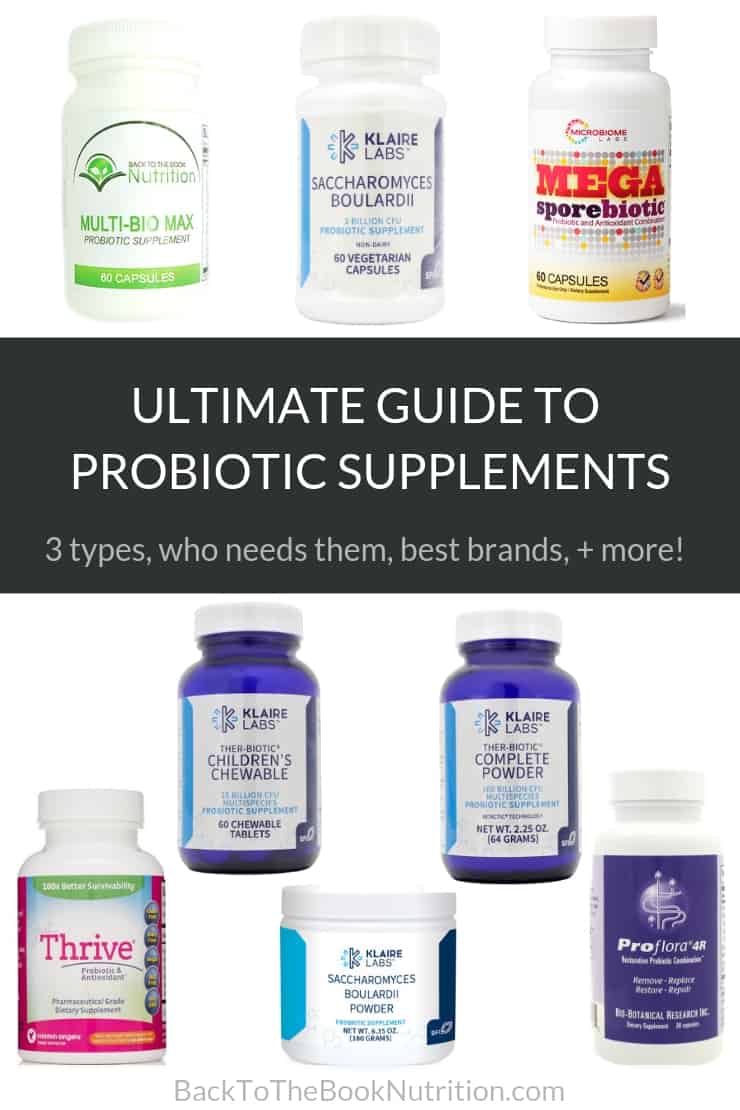
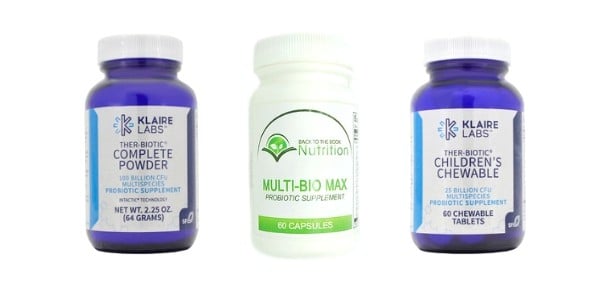
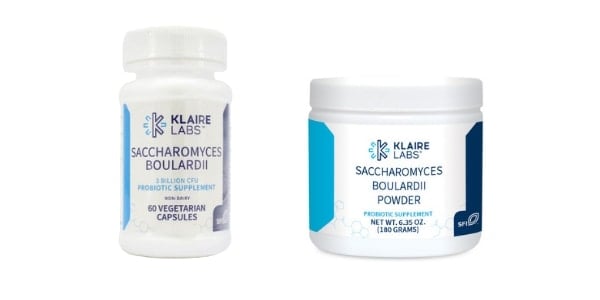
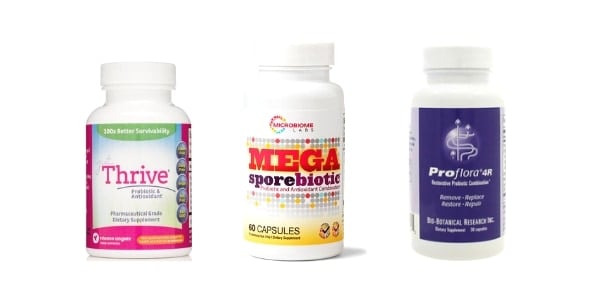
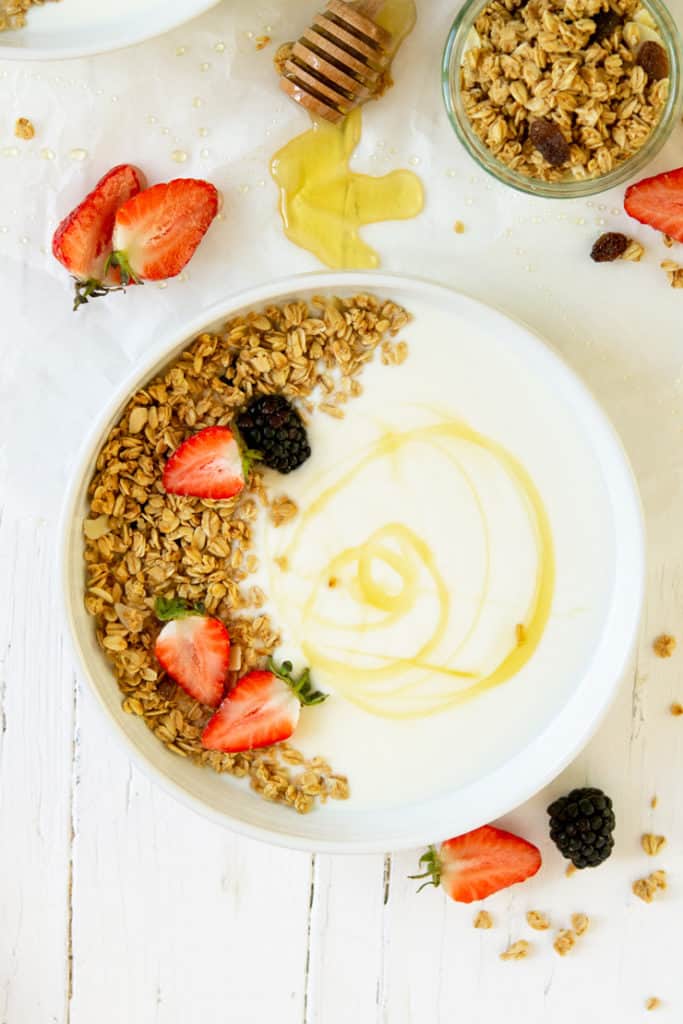

I don’t take supplements at all but it was so great to learn more about probiotics through this post. I will have to check these recommendations out.
Glad that you found this helpful!
I studied biochmistry. I know about probiotics very well. Nice to share.
So cool Ebuka that you studied bio-chemistry! Gald to hear that you liked the article!
This was an interesting post about probiotics. We don’t have supplements here in Japan but they have liquid drinks.
Thanks for sharing Aisasami! Interesting to hear that they dont provide the supplements there., but there are so many wonderful things in Japan to enjoy! It is a great country!
Thhis is very helpful. I did not know probiotics have so many additional benefits!
I am glad that you found the article helpful Shushmita!
Absolutely! I am happy that you found the article informational Shushmita!
This was a very helpful guide! I have Rheumatoid Arthritis and the wrong probiotics seem to have a very adverse effect and make me physically ill with flu like symptoms.
Thanks for sharing that with us Razena! I am glad that you find the article useful!
Very helpful and informative article!! It has everything needed to know about supplements and so many different options!
Glad that you found it to be helpful Mariana!
Great article. There are many healthy benefits of probiotic supplements . I am not a medical person but I can relate to what you are discussing. Thank your for sharing this to us.
There are many healthy benefits of probiotic supplements and these were clearly discussed in this article. Thank your for sharing this to us.
There are many healthy benefits of probiotic and these were clearly discussed in this article. Thank your for sharing this to us.
Glad that you like it Ramil!
Very useful and informative one. Thanks for sharing the article.